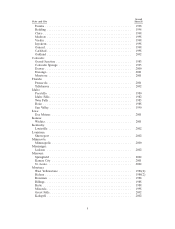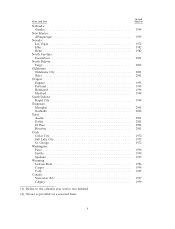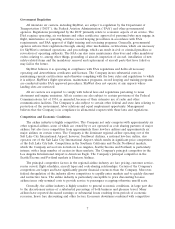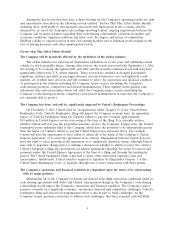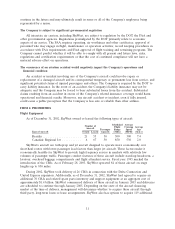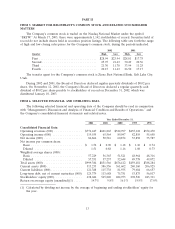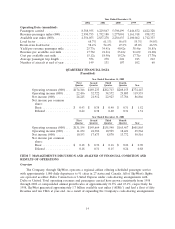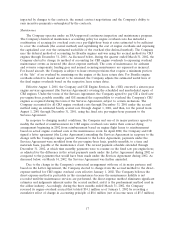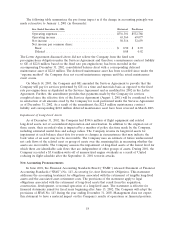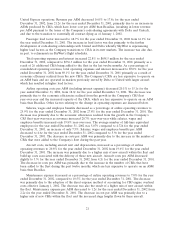SkyWest Airlines 2002 Annual Report Download - page 19
Download and view the complete annual report
Please find page 19 of the 2002 SkyWest Airlines annual report below. You can navigate through the pages in the report by either clicking on the pages listed below, or by using the keyword search tool below to find specific information within the annual report.with Delta and United and additional aircraft acquisitions, SkyWest generated approximately 4.4 billion
ASMs in 2002 with a fleet of 76 Brasilias and 73 CRJs at year-end.
SkyWest has been a code-sharing partner with Delta in Salt Lake City and United in Los Angeles
since 1987 and 1997, respectively. In April 1998, SkyWest expanded its United Express Agreement to
provide service as United Express in United’s Portland and Seattle/Tacoma markets and in additional
Los Angeles markets which began in April 1998. In January 1998, SkyWest expanded its operations to
serve as the United Express carrier in San Francisco which began in June 1998. In November 2001,
SkyWest expanded its operations to serve as the Delta Connection carrier in Dallas Ft. Worth. Today,
SkyWest operates as The Delta Connection in Salt Lake City and Dallas Ft. Worth and as United
Express in Los Angeles, San Francisco, Denver and in the Pacific Northwest. SkyWest believes that its
success in attracting multiple code-sharing relationships is attributed to its delivery of high quality
customer service and a competitive cost structure.
Multiple code-sharing relationships have enabled SkyWest to reduce reliance on any single major
airline code and to enhance and stabilize operating results through a mix of SkyWest-controlled flying
and contract flying. On SkyWest-controlled flights, SkyWest controls scheduling, ticketing, pricing and
seat inventories and receives a prorated portion of passenger fares. On contract routes, the major
airline partner controls scheduling, ticketing, pricing and seat inventories with SkyWest receiving from
its major airline partners negotiated payments per flight departure and incentives related to passenger
volumes and levels of customer service. Essentially all of the Company’s United Express flights have
been under contract flying from inception of the United agreement in 1997. The Company transitioned
all of its Delta Connection CRJ flights to contract flying October 1, 2001 and transitioned all of its
Delta Connection Brasilia flights to contract flying effective January 1, 2002. This transition resulted in
essentially all SkyWest flights operating as contract flying as of January 1, 2002. During the year ended
December 31, 2002, approximately 62.7% of SkyWest’s capacity was under the Delta code and 37.3%
was under the United code. As of December 31, 2002, the Company had agreements to acquire an
additional 70 CRJs with deliveries from January 2002 through January 2005 and options for an
additional 119 CRJs. These aircraft will be allocated between the Company’s Delta Connection and
United Express operations.
On September 11, 2001, the FAA grounded all flights to, from, and within the United States as a
result of the terrorist attacks in New York, Washington D.C., and Pennsylvania. All airports were closed
and did not reopen until September 13, 2001. When flights were permitted to resume, passenger traffic
and yields were significantly lower than prior to the attacks. United reduced its flight schedule to
approximately 80% of the schedule it flew prior to September 11th. As a result, SkyWest began to
reduce its Brasilia fleet flown under the United code. During the year ended December 31, 2001, the
Company terminated certain Brasilia aircraft leases early and recorded a $3.4 million write-off of
unamortized engine overhauls and an accrual of $1.2 million for the remaining lease payments related
to Brasilia aircraft parked as of December 31, 2001. To help compensate airlines for their losses, the
U.S. government passed the Air Transportation Safety and System Stabilization Act (the ‘‘Stabilization
Act’’). Under this Act, the Company received approximately $12.6 million to help compensate for losses
resulting from the terrorist attacks of which $8.2 and $1.4 million was recognized during the years
ended December 31, 2001 and 2002, respectively.
On December 9, 2002, United filed for reorganization under Chapter 11 of the United States
Bankruptcy Code. United’s bankruptcy filing is due in part to the tremendous operational and financial
challenges faced by the airline industry in general, and the Company’s major partners in particular.
Among other factors, the airline industry has been and will continue to be affected by the
September 11, 2001 terrorist attacks and the recently commenced war with Iraq, the slowing U.S.
economy, higher fuel and insurance costs, and tightened credit markets. As the Company’s major
partners restructure to address such challenges, they have required, and will likely continue to require,
the Company’s participation in efforts to reduce costs and improve their financial performance.
15


